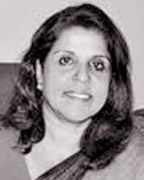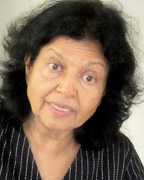NCPA refutes US child sex trafficking claim
By Manjula FERNANDO
A report issued by the office of the US Secretary of State last week
has identified Sri Lanka as a destination and a source of child sex
trafficking. A claim that the National Child Protection Authority
refuted due to the apparent lack of proper supporting data.
 |
 |
| Anoma Dissanayake |
Dr. Hiranthi Wijemanna |
The Sunday Observer spoke to the National Child Protection Authority
Chairman Anoma Dissanayake and Dr. Hiranthi Wijemanne, member of UN
Committee on Rights of the Child who is a vociferous child rights
activist with a career spanning for over three decades on this report.
NCPA Chairman Anoma Dissanayake,
I came to know of the report when it was published on the web. There
is a big question mark as to where they got hold of the statistics to
say that Sri Lanka is a destination for child sex trafficking and male
child prostitution. Complaints to NCPA about boys are very rare.
I must ask why these statistics were not referred to the NCPA, as the
sole authority which looks after the rights of Sri Lankan children. We
should have been notified and if there is data, to make them available
to initiate legal action.
We don't deny that we have an issue of child prostitution but it's
not as serious as some neighbouring states in our region. Even the
western countries have issues of child prostitution.
I would like to request those who point fingers at us to assist the
NCPA with funding and other resources to clear our path in implementing
our mandate better than now. If they say there is a big issue they must
help us identify the places and people involved so that the perpetrators
can be brought to book. The NCPA carried out a surveillance within the
past six months and earlier during November- December tourist season
covering Hikkaduwa and Negombo. We identified a number of places where
child sex incidents could be suspected. But these places need to be put
under further surveillance before legal action can be initiated.
The officers need to operate under cover and the battle with
technology is very severe since the places of this nature are protected
by CCTV cameras and their security features to keep out the 'intruders'.
Nevertheless, the surveillance is continuing to the next tourist season.
We are continuing with the campaign to create awareness among the
parents of families living in the coastal belt, where the tourism
industry is prominent. We have begun educating them of the risks of
contracting AIDS by the children who are victims of child sex, make them
understand the gravity of the sexual exploitation of children. The
children who get drawn into child prostitution are mainly from poor,
uneducated families. I would not deny that there are financial
constraints to tackle the issue.
Attempts to blow the issue out of proportion will have a negative
impact and will not help efforts to protect our children. I must warn
that some of the NGOs who claim to do a lot of work in this area are
just singing for their supper.
This issue is also like the issue of Lankan asylum seekers. NGOs try
to distort the real picture for their own survival and sustenance. We
need real help, not damning reports to tackle the issues in the domestic
front. UNICEF is also channelling their funds through these NGOs and of
late there has been very little assistance directed to the NCPA.
Dr. Hiranthi Wijemanna:
The crux of the matter is that we don't have a proper database to say
that if there are more or less cases of child prostitutes. You must
remember when it comes to issues like prostitution you can't just do a
survey and ask 'are you a prostitute? yes or no'. It is very much
complicated than that. There are so much of unverified reports. Some
cases get reported to the police and sometimes to the media.
One of the key factors promoting child prostitution is troubled home
fronts. Sometimes the mother is not with the children, home environment
is missing, school drop outs, then alcoholism in the home front,
unemployment, all these factors are triggers for the children to get
dragged into this trade.
We need a database and more research, to find out who are more
vulnerable. As much as, getting the girls who go into prostitution
rehabilitated and back to society, we must strive to prevent such things
from happening.
For that we have to educate the girls, their families and support
these families become financially stable.
We have to set up surveillance systems in tourism zones, to identify
the offenders and ensure children are in a protected environment.
It is also important under child sex tourism, a mechanism to monitor
the internet. It is questionable how the US state Department came to the
conclusion on child sex workers, and based on what data they made this
assumption and who collected this data is not clear.
Earlier, about 10 years ago, they quoted that there were about 30,000
child prostitutes in the country. This data was sourced to PEACE
(Protecting Environment and Children Everywhere), when I contacted the
chairperson of this NGO, she said they never said like that, apparently
one of their officers has said that it might be about 30,000. But that
is not the way the things should be done. Reports should be based on
verified data.
In many countries child prostitution is becoming an increasing
problem. In the South Asian region, this issue is prominent in India,
Indonesia, Pakistan and Nepal, etc.
The push factor is poverty and unemployment. The child pornography is
another issue. To tackle this issue, we have to set up proper
surveillance to identify perpetrators.
Tourism Board has done a quite a lot in the past to prevent and
control child sex tourism. But they need to expand due to his new thrust
on tourism after the end of the war. This is an area we need to
emphasize.
We cannot say Sri Lanka has a bigger issue compared to other
countries in the region since we don't have the necessary facts to
support that claim. But in the case of children we consider even one
child victim is too much. We have to protect children, because they are
vulnerable, they are the worst victims of poverty and they are the first
to get exploited. What we have to do is set up protective mechanism to
prevent children in vulnerable situations being dragged into sex tourism
or child pornography. It is not exclusive to Sri Lanka it is a global
request.
|

